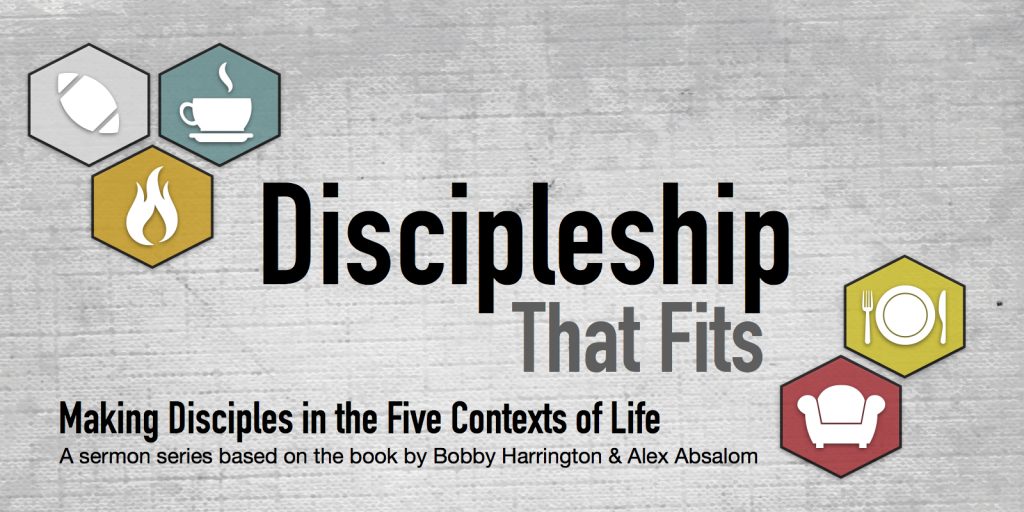16 One day as Jesus was walking along the shore of the Sea of Galilee, he saw Simon and his brother Andrew throwing a net into the water, for they fished for a living. 17 Jesus called out to them, “Come, follow me, and I will show you how to fish for people!” 18 And they left their nets at once and followed him. Mark 1:16-18
Over the past several weeks, we’ve defined discipleship as the process of helping people trust and follow Jesus. We drew that definition out of the great commission in Matthew 28, where Jesus instructed his disciples to go and make disciples of all the nations, baptizing them and teaching to obey all that Jesus had taught. So as we looked at that passage, we came to the conclusion that discipleship is all about helping people trust and follow Jesus.
But now this morning, I want to give you another definition. We’ve defined: what is discipleship? But now I want to define: what is a disciple? And I realize there is certainly going to be come overlap in these two definitions – but I think this will help us gain a clearer picture of what a disciple actually is. And based on this passage that we just read, this is the definition I would give you.
“A disciple is following Jesus, is being changed by Jesus, and is committed to the mission of Jesus.”
I think those three elements are key aspects of true discipleship.
- A disciple follows Jesus – we talked about that when we defined discipleship. It starts with trust – because only when we trust Him, that will we follow Him. That’s why discipleship is helping people trust and follow Jesus.
- A disciple is being changed by Jesus. In the NLT translation, Jesus says “I will show you how to fish for people” – but the more literal translations of that passage make it a bit clearer that Jesus is inviting them to be changed. The ESV says “I will make you fishers of men.” And the NET says “I will turn you into fishers of people.” So there’s clearly a process of change here. That’s important for us to remember as we think about out own discipleship today. We can’t stay the same as we follow Jesus. If we’re not changing, we’re probably not following.
- A disciple is committed to the mission of Jesus. Jesus is inviting us to do exactly what he is doing. Our mission is his mission – and that is to make fishers of men. To make disciples who will make disciple who will make disciples.
And so if we are a disciple of Jesus – those three things are happening. We are following Jesus, we are being changed by Jesus, and we are committed to the mission of Jesus.
Now I realize that I’ve pretty much just given you an entire sermon super condensed into one minute – I probably should have taken a whole message to work through all that – but I wanted to give you that definition as we begin to look at the next context of discipleship.
If you’re just joining us today, are a mid-way through a series of messages called “Discipleship that Fits”. We recognize that Jesus has called us to be disciples and to make disciples, but we’re not always sure exactly how to do that. And because our world and our culture and our circumstances are different from Jesus’ – we can’t mimic Jesus exactly in how he made disciples. We sure can’t walk on water or raise people from the dead or have 12 men follow us around everywhere. But we can certainly learn the patterns and and principles that Jesus used in the discipleship process and apply to them to our own unique situations today.
And so we’ve been looking at the five contexts where Jesus made disciples. These are the five kinds of relationships that Jesus had where discipleship happened.
So far we’ve looked a the public context and the social context. And now today, we’re going to look at the personal context.
So just to give you a quick recap – the public context is typically when we are gathered in groups of 100 or more. Examples of Jesus making disciples in this context would be when he preached to the crowds, or did miracles in the marketplaces or on the mountainside – or all the parables that Jesus told. Certainly that played a part in helping many people trust and follow Jesus. A good example of our modern equivalent would be the Sunday morning worship service where we gather to hear preaching and teaching as well as to share stories with one another of how God is at work in our lives. That too, helps people in a significant way to trust and follow Jesus.
Then last week we looked the social context – that’s more like a group of 20-70. We were reminded of all the dinner parties that Jesus attended and how he used that social context to live out the lessons that he wanted people to learn. If the public context is where Christianity is taught – the social context is where Christianity is caught. We’re not just hearing how to be a disciple – we’re seeing an example right in front of us – we might even be participating in that example. And so for a church, the social context includes everything from kids clubs to potlucks to helping at the Fall Festival to Survivor Parties – And in all these gatherings, we (and everyone else there) gets the opportunity to see how Christians live. We get to live out all those one another commandments – like “serve one another”, “have compassion on one another”, “forgive one another” – “encourage one another.” All of this helps us learn to do by doing. We get to participate in the lesson.
And now today, we’re going to take that one step further – one level deeper – as we look at the personal context.
Leave a Comment

